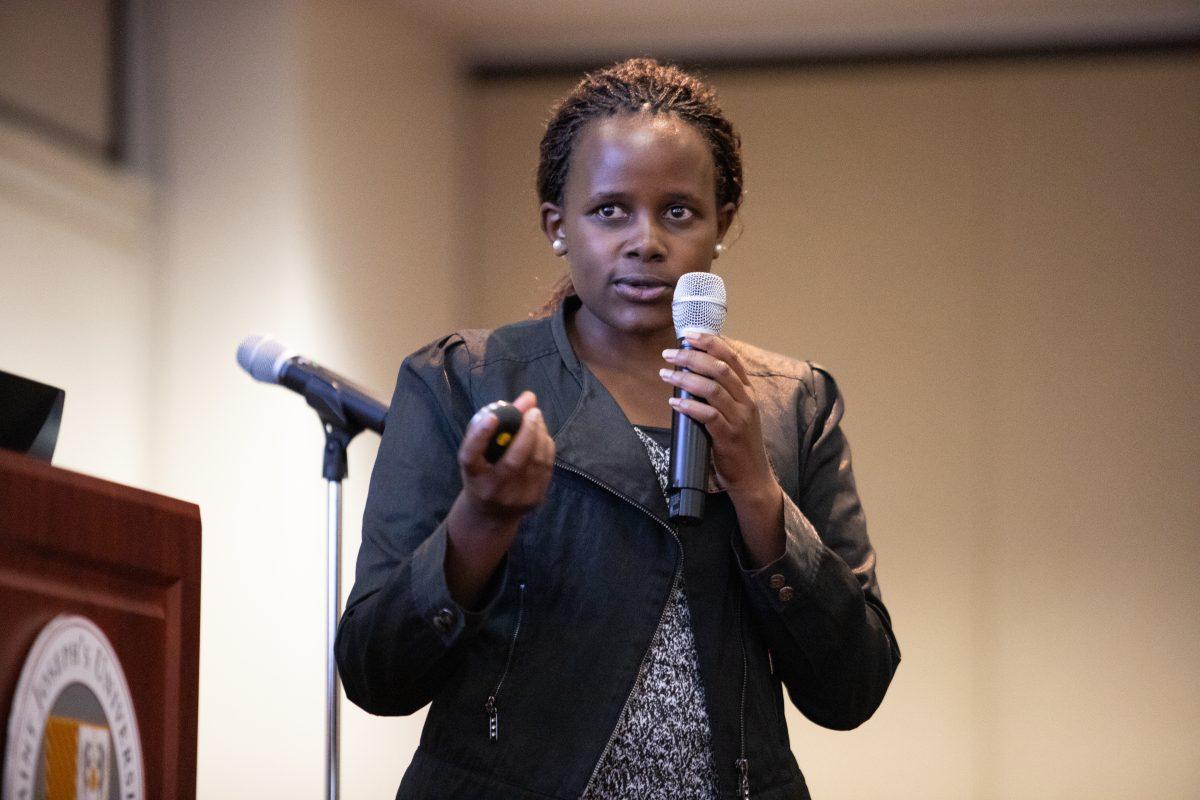Refugee education advocate and Rwandan Genocide survivor Dr. Mireille Twayigira, M.D., spoke about her experiences as a refugee in a lecture on Feb. 27.
In 1994, two-year-old Twayigira and her family were forced to flee their home after her father was killed in the genocide. Her family spent the next six years moving between refugee camps in Rwanda, Zambia and Malawi, covering the equivalent distance between Los Angeles and New York on foot. Her mother, sister and grandmother died along the way.
After arriving at Dzaleka Refugee Camp in Malawi, Twayigira became a stu- dent of the Jesuit Refugee Service’s (JRS) education program.
“Despite all the challenges, me and my classmates would wake up every day, we’d go to school and we’d work hard because we knew that school held our only help,” Twayigira said in an interview with The Hawk. “Despite our past, education was the key that would help us come out of all that. We were not sure if we’d get a chance [to go to] university, but we were ready whenever a chance was presented.”
In 2010, Twayigira graduated high school as one of the top three academically ranked females in the country, providing her the chance to attend university.
With aid from JRS, along with the Malawian and Chinese governments, Twayigira gained citizenship in Malawi, providing her with a passport that allowed her to begin her medical studies in China.
After a year of language school to learn Mandarin, she entered a four-year medical program, becoming a doctor in 2016. Once she completed a year-long medical internship back in Malawi, Twayigira was offered a position with JRS, which involved traveling and speaking about her experiences as a refugee.
“I got this chance to work with the same organization that had been very influential in my own life, to be able to ad- vocate for other young refugees in terms of education because I had seen how important it had been in my own life, how transformational it had been,” Twayigira said. “I am here because I am someone whose life has been very much influenced and very much transformed by education.”
For Josee Bell ’22, who attended the lecture, Twayigira’s story put a face to the international issue of forced migration.
“When you read about [forced migration], it’s different than when you see someone who went through it,” Bell said. “I thought it was really inspirational. She was really strong.”
Richard Gioioso, Ph.D., assistant professor of political science, said that beyond her story serving as inspiration, hearing about individuals like Twayigira offers St. Joe’s students a well-rounded perspective on global issues.
“It is important for Americans and college students in particular, through their studies, to learn more about the world,” Gioioso said. “Having Dr. Twayigira here is an aspect of that. To come in close contact with and hear the stories of refugees and political asylees, who at this point are in the news a lot and there is a lot of misunderstanding or misinformation, that’s a real privilege for us to have hosted her here and heard her story.”
Josh Utter, outreach and advocacy coordinator for JRS, said that beyond donating money, individuals can be contributing to the cause by educating themselves and others and petitioning their government officials to create legislation that protects forced migrants.
“[The JRS] mission is to accompany, advocate and serve refugees and forcibly displaced persons throughout the world, and a lot of that looks like education programs, workforce development, psycho-social support and also some emergency response,” Utter said.
Twayigira said the value of her story and her work is helping to secure education for the next generation of refugees.
“Jesuit Refugee Services want to help refugees to heal and also give them a way to determine their own futures so they can become who they want and support their families and the community,” Twayigira said in her lecture. “These innocent refugees whose lives have been turned upside down, at least they have a chance [of] a brighter future.”
Alysa Bainbridge ’21 contributed to this article.















































